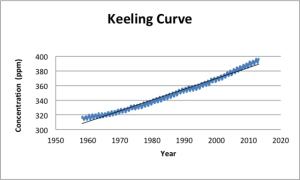Breathing up with the Planet
Charles David Keeling was a young curious scientist from California. In the early 1950’s he started to build devices that could track the exact amount of the carbon dioxide from the atmosphere. 1956 he established a small observatory at the top of Mauna Loa, Hawaiji. With his measurement, he discovered how planet is breathing: the amount of CO2 increasing at night time and again slowing down in the afternoon. The phenomenon was due to local respiration of the plants.
Later he discovered the seasonal patterns: CO2 levels peaking in May, while dropping to a low in October. But even more interestingly, he found how year after year the amount of CO2 tended to rise, slowly but surely. The ultimate measurement for tracking human induced climate change was born. And ever since, this upward trend has served as a backbone to emerging alert about changing climate.
On last Tuesday, Geologist James Lawrence Powell released a study about climate change articles in scientific journals. From over of 10 000 studies he had gone through, only two denied existence of man-made climate change. Which really proves that we have arrived at a situation where in the science community – based on evidence -there seems to be no doubt about the existence of human induced climate change.
This study was released on the eve of second part of Intergovernmental Panel for Climate Change (IPCC) report. Report assessed the impacts of climate change. This compilation of studies is the fifth report in row, building up the evidence that could be used for climate negotiations where next real progress is expected to happen next year in the next round of United Nations led negotiations. The report was particularly gloomy in assessing the impact for the farmers: more droughts and more extreme weathers.
This report was a second in row. Last September, the fist part was released, stating that 2/3 of the fossil reserves of the earth should be left untouched if we want to be anywhere near to the limit of 2 Celsius temperature growth which is seen as a critical threshold before a more devastating runaway impact of changing climate. Whatever happens with the warming, we should make sure that the remaining fossil fuels remains on the ground. We are indeed pulling our own leg if we are not taking action on this.
Ever since I started to work 1992 with a Finnish research programme on climate change I have been following the debate very closely. There have been twists and turns in climate change research as well as in political negotiations. Much less has happened than could have been expected in the 1990’s. Still it is so hard for some to see this is exactly what we need, to boost the innovation, technological progress and more efficient functions in our societies.
Even if the climate would suddenly start to get colder after 2020 -which is entirely possible since little ice-ages have been experienced before -we would not regret if we had invested on new, renewable technologies and leave the fossil era behind. New technologies means new investments, new jobs, new industries, new possibilities. Moreover: man’s soul need to look pretty dark if enjoys seeing birds after the oil leakage trying to get rid of this nasty stuff on their feathers. In increasing search for the harmony with nature, we need to piggyback the battle against climate change for renewing our economies.
For this end, Charles David Keeling is our man. He was ultimately a nature lover, who was shocked to find out that we are changing the delicate balance of Earth’s breathing system. He observed, based on his measurements, that every year Earth is breathing more laboriously, because of increased levels of CO2. And we all know what laborious breathing means: the stress level rises and for other organs it becomes hard to keep up with the rising pace.
This is why China, US and other laggards should face the reality: its time to change the model for growth. All the current models show that continuing with business as usual scenario means devastating impacts for key agricultural areas of the world. Even if were not great nature lovers we should be alarmed if the very existence of well-being in this planet is being threatened. If not, I wonder how they will explain their inaction to the generations to come.
